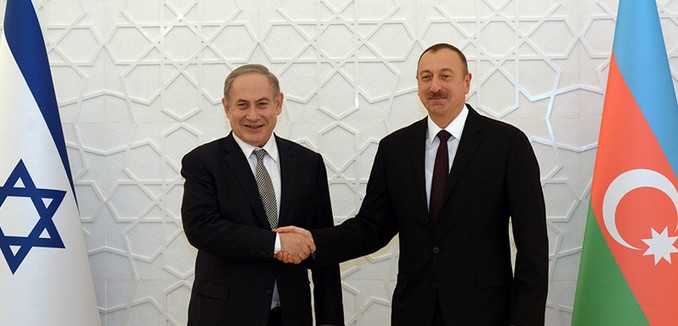The growing ties between Israel and the Shiite-majority country of Azerbaijan are a praiseworthy example of “Muslims and Jews working together to secure a better future for both of us,” Israeli Prime Minister Benjamin Netanyahu said during a visit to the Central Asian nation on Tuesday.
Netanyahu and Azerbaijani President Ilham Aliyev signed numerous bilateral agreements governing tariffs, agricultural cooperation, and the establishment of a commission to advance further cooperation in science, technology, health, agriculture, trade, and other economic matters. Netanyahu, who also visited Azerbaijan in 1997 during his first stint as prime minister, was in the country to commemorate 25 years of diplomatic relations between the two countries.
Aliyev publicly revealed at the ceremony that his country has purchased nearly $5 billion in military equipment from Israel over the years. Azerbaijan, which borders Iran, is reportedly interested in purchasing Israel’s Iron Dome rocket defense system.
Oil sales from Azerbaijan make up the bulk of the trade between the two nations, but Aliyev said that he would like to “diversify” trade with Israel, specifically mentioning advanced Israeli technologies.
Netanyahu is scheduled to travel to Kazakhstan on Wednesday to meet with President Nursultan Nazarbayev. Kazakhstan, a Sunni-majority country, is slated to be a member of the United Nations Security Council for the next two years.
Before he left on his Central Asian sojourn, Netanyahu said that “in complete contrast to what is heard from time to time, not only is Israel not suffering from diplomatic isolation, Israel is a country that is coming back. These countries want very much to strengthen ties with Israel and following the strengthening of our relations with the major powers of Asia, with countries in Africa and with countries in Latin America, now come ties with important countries in the Islamic world.”
In July, Netanyahu embarked on a historic tour of East Africa and restored diplomatic ties with the Muslim-majority nation of Guinea, and in September met with 15 African heads of state and ambassadors at the United Nations General Assembly. In the coming year, Netanyahu has scheduled diplomatic trips to Australia, Singapore, and Fiji.
Netanyahu has also prioritized strengthening ties with India; the Jewish state is now one of the top military suppliers to India, with sales of up to $1 billion annually. The two countries have also embarked on the joint development of the Barak-8 surface-to-air missile, which the two countries’ navies successfully tested together last year. Indian Prime Minister Narendra Modi is expected to visit Israel in 2017, the first for a sitting Indian head of government.
[Photo: Ministry of Foreign Affairs ]




